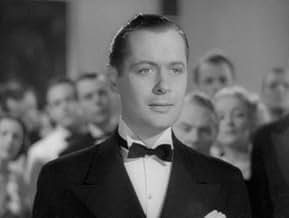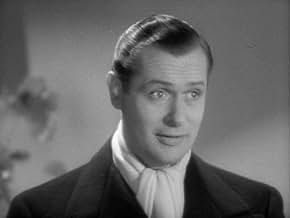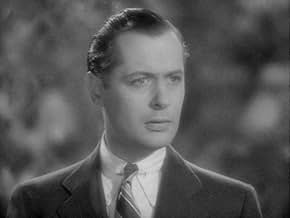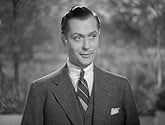Ajouter une intrigue dans votre langueA society girl tries to reform her playboy husband by making him jealous.A society girl tries to reform her playboy husband by making him jealous.A society girl tries to reform her playboy husband by making him jealous.
Charles Ruggles
- Edgar
- (as Charlie Ruggles)
Joan Fontaine
- Caroline
- (as Joan Burfield)
John David Horsley
- Duffy
- (as David Horsley)
E.J. Babille
- Desk Clerk
- (as E.J. Babiel)
Jean Acker
- Nightclub Extra
- (non crédité)
Gertrude Astor
- Nightclub Extra
- (non crédité)
Clem Beauchamp
- Drunk
- (non crédité)
Brooks Benedict
- Joe Williams - Bar Owner
- (non crédité)
Veda Buckland
- Marcia's Maid
- (non crédité)
Histoire
Le saviez-vous
- AnecdotesBig-screen debut of Joan Fontaine (listed as Joan Burfield).
- GaffesWhen Sherry and Fanny are talking in front of the fireplace, from one scene to the next his position changes back and forth. First he's standing and facing Fanny, who is sitting as they talk; then he is to her side, kneeling on a sofa bench with his back to her and leaning on the fireplace hearth. Then he is back opposite her, standing and facing her as they talk; then he's back kneeling on the sofa and leaning on the hearth. Then he's once again standing and facing Fanny.
- Citations
Oliver Allen: Look here, you can't go up there--she might be in bed!
Sheridan 'Sherry': Since when has a lady in bed been an object of repugnance?
- ConnexionsFeatured in Joan Crawford: The Ultimate Movie Star (2002)
- Bandes originalesAll I Do Is Dream Of You
(1934) (uncredited)
Music by Nacio Herb Brown
Lyrics by Arthur Freed
Played on banjo by Arthur Treacher and
Sung by Gail Patrick at the party
Commentaire à la une
For sporadic moments of amusement "No More Ladies" is perfectly satisfactory. It has the MGM lusciousness and gleam that the other studios envied. Note the great looking costumes on Joan Crawford, Joan Fontaine, and Gail Patrick wear. The sophistication is showed by the ho-ho-ho jokes that are dropped by the likes of Crawford, Robert Montgomery, Franchot Tone, and Edna Mae Oliver. This is the type of film that has the hero with a name like "Sherry". People go to night clubs, and to fancy restaurants, and take drives in Central Park at night (it is, after all, the 1930s).
The film is a bore - it occasionally amuses because of the cast, but the dialog is brittle for the sake of brittle. It is Noel Coward's world but not the real wit he brought - Coward's best plays show a streak of harshness and mutual malevolence mixed with affection in his couples like Amanda and Elyot in "Private Lives". They also tend to be smarter than the characters here.
Also the characters are not all that amusing nowadays. Montgomery's cousin is Charlie Ruggles, who is constantly drunk. Ruggles is a favorite comedian to me, but here he was dull. Reginald Denny is around as a British version of Ralph Bellamy - an available alter-suitor to Montgomery for Crawford, and while Denny is elegant (in a skittish sort of way) he is not at all as amusing as Ralph Bellamy was in "His Girl Friday" or The Awful Truth".
After watching this film I stopped to consider the three leads. Montgomery was typecast for most of the 1930s (except for an occasional film like "The Big House") as a happy, amoral socialite. Nobody really played the upper-crust cad as well as he did, but he got bored by it, and fought for meatier parts - and after his brilliant Danny in "Night Must Fall" he got them. Crawford reveled in parts like the hard-working lower class girl fighting her way to happiness, but she did many "socialite" parts as well. Along came "The Women", and she played a villainous social climber. After that came the really hard-boiled darker parts of the 1940s and 1950s like "Mildred Pierce" and "A Woman's Face" and "Flamingo Road". Tone, in 1935, would start having roles like Bryam in "Mutiny On The Bounty" - like Montgomery he would play his wealthy cads, but he would be able to step into nastier, meatier roles like "The Phantom Lady" and "The Man On The Eiffel Tower". When one talks to their fans about the great work of these three actors, it is the films where they played characters with demons after them that are recalled. Few really recall a piece of meaningless cotton candy like "No More Ladies" regarding any of them.
The film is a bore - it occasionally amuses because of the cast, but the dialog is brittle for the sake of brittle. It is Noel Coward's world but not the real wit he brought - Coward's best plays show a streak of harshness and mutual malevolence mixed with affection in his couples like Amanda and Elyot in "Private Lives". They also tend to be smarter than the characters here.
Also the characters are not all that amusing nowadays. Montgomery's cousin is Charlie Ruggles, who is constantly drunk. Ruggles is a favorite comedian to me, but here he was dull. Reginald Denny is around as a British version of Ralph Bellamy - an available alter-suitor to Montgomery for Crawford, and while Denny is elegant (in a skittish sort of way) he is not at all as amusing as Ralph Bellamy was in "His Girl Friday" or The Awful Truth".
After watching this film I stopped to consider the three leads. Montgomery was typecast for most of the 1930s (except for an occasional film like "The Big House") as a happy, amoral socialite. Nobody really played the upper-crust cad as well as he did, but he got bored by it, and fought for meatier parts - and after his brilliant Danny in "Night Must Fall" he got them. Crawford reveled in parts like the hard-working lower class girl fighting her way to happiness, but she did many "socialite" parts as well. Along came "The Women", and she played a villainous social climber. After that came the really hard-boiled darker parts of the 1940s and 1950s like "Mildred Pierce" and "A Woman's Face" and "Flamingo Road". Tone, in 1935, would start having roles like Bryam in "Mutiny On The Bounty" - like Montgomery he would play his wealthy cads, but he would be able to step into nastier, meatier roles like "The Phantom Lady" and "The Man On The Eiffel Tower". When one talks to their fans about the great work of these three actors, it is the films where they played characters with demons after them that are recalled. Few really recall a piece of meaningless cotton candy like "No More Ladies" regarding any of them.
- theowinthrop
- 7 nov. 2005
- Permalien
Meilleurs choix
Connectez-vous pour évaluer et suivre la liste de favoris afin de recevoir des recommandations personnalisées
Détails
Box-office
- Budget
- 765 000 $US (estimé)
- Durée1 heure 20 minutes
- Couleur
- Rapport de forme
- 1.37 : 1
Contribuer à cette page
Suggérer une modification ou ajouter du contenu manquant

Lacune principale
By what name was La femme de sa vie (1935) officially released in India in English?
Répondre






















